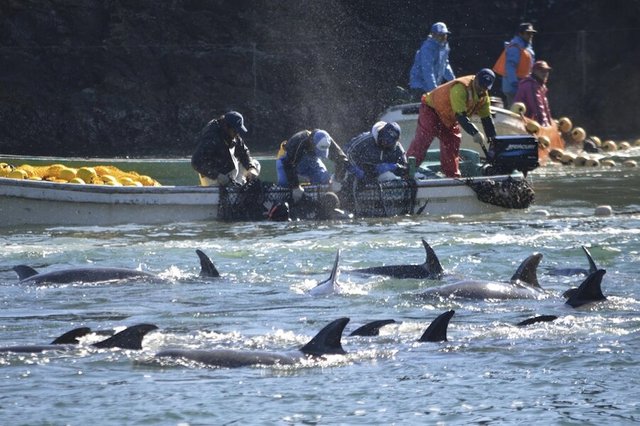As a child, one of my favorite memories was to visit Shedd Aquarium in Chicago and beg my parents to watch the aquatic show, even though it cost us a few extra bucks. That dollar amount didn't matter to me, and it didn't matter to my parents as long as we got to see smiling dolphins and back flipping porpoises. Between the age of five and twenty three, it never dawned on me to think of how those animals came into captivity or became assigned to be an aquarium specimen.
Taiji, Japan, is one of the world's top providers of live dolphins. Every September, thousands of specimens are herded in the ocean and eventually captured and displayed for sale. Trainers from around the globe come to Taiji to pick out the ones they can train and make more money off of. Once they are picked, they are transported. The ones that are not selected are rounded off into a separate area where the fishermen spear and kill them. They are sold for meat. The going price for a live dolphin is 150 thousand dollars while a dead one is worth six hundred.
The killings of these animals is inhumane as they suffer because the method of killing is lengthy. Since they are herded into a group for killings, many times these animals die while swimming in their own blood. The cove is flooded with the blood of these mammals while the fishermen continue to spear them. The International Whaling Commission states that the humane killing is done with a spear that goes into the spine and kills the animal instantly. Oscar winning director, Louie Psihoyos, captures footage through hidden camera in Japan to depict just how brutal these "humane" killings are.
In fact, most of the Japanese population isn't even aware that this occurs in their country. Upon discovery, they are often shocked and also plea that something be done about this. But back in the United States, this is hidden though cleverly painted image of institutions like Sea Word who make millions every year off of the possession of one dolphin. It is said that institutions such as this make two to three million per mammal.
A universal marine problem is mostly focus about plastic pollution, but rarely do I see people fighting for the abusing of marine animals of any kind. Knowledge is power. And how much can you say you really know about this topic? Awareness is key in the controlling or ending of this practice. It was once said by Margaret Mead that you cannot wait for government or institutions to fix a major problem. All social change comes from the passion of individuals.
